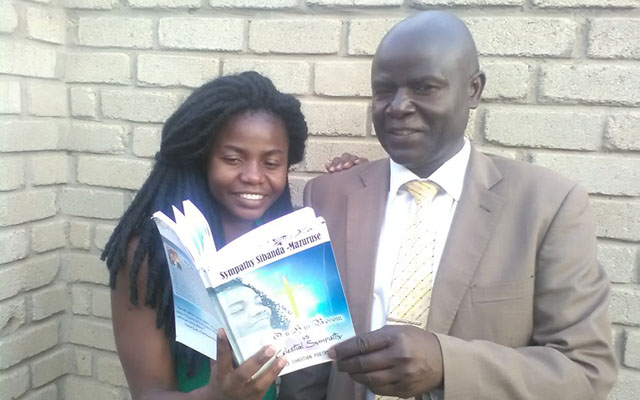Father, daughter share joy of poetry


Sympathy and her father whose poem is featured in her 2016 poetry anthology “On His Bossom”
Beaven Tapureta Bookshelf
Sympathy Sibanda-Mazuruse (SSM) is one of the new female voices in Zimbabwean poetry circles. She has so far published two poetry anthologies, namely “Matters of Life” (2009, Veriest Solutions International) and “On His Bossom versus Celestial Sympathy” (2016, Balukwe Content). Sympathy also performs her poetry at various public gatherings. Here she discusses with Bookshelf her writing life.
Bookshelf: In your latest anthology “On His Bossom”, you included a poem written by your father. What inspired him to want to be part of the anthology?
SSM:(Laughs) Oh my word! That poem is in itself a miracle. It found itself in the anthology due to “miraculous methods”. Well my father, Mr Austin Ngwenya Sibanda, is in my books a good writer who has never explored his art. I believe that’s where my talent comes from. I only knew my father was very intelligent and a great advisor but never a writer until I stumbled on his “notebook” which had in it a very beautiful poem. I gasped and wondered why he had never ventured in full time writing. My father never knew his poem was part of my anthology as I sneaked it in. He was shocked when he bought my book (yes . . . my family always buy my books), and saw his poem with his name written on it. He was overjoyed. Therefore, that poem is my father’s first published work of art. I am yet to coerce him to come up with his own anthology, surely!
Bookshelf: How has been Christian poetry’s reception in Zimbabwe?
SSM: Yes, Christian poetry is really embraced abroad and I think it’s time we embrace it wholesomely here as well. There are many international platforms for sharing Christian poems, publishing and performing them. This is not just in poetry but also in dramas, acting and Christian novels. I guess the Christian wave is permeating the arts sector in Zimbabwe which was previously perceived as secular.
Bookshelf: How should Christian poetry sound for it to fit into the Christian genre?
SSM: Christian poems should be spiritually didactic. People should, after reading your poems, learn something spiritual. It should evoke what are described in the Bible as the fruits of the spirit which include love, joy, peace, goodness and faith. Poetry is naturally “protest”, therefore with Christian poetry the protests are in leading people to Christ who is the greatest hope against the strife we face in the world. My poetry is deliberately Christian poetry and meant to evoke what has been described above. I see myself as the modern Psalmist as my poetry is influenced by the book of Psalms written by King David.
Bookshelf: It is eight years since :Matters of Life” was published, are there any plans to translate it into indigenous languages?
SSM: The thought of translating the book into five vernacular languages and Portuguese has crossed my mind. I have worked on several formal papers that have been translated but these were not poems and therefore with poetry I should really have translators who have a poetry background as well. Amazingly, this book was my debut anthology and has really fared well. I think because I made a point of putting the book in almost all bookshops and art stores. I donated copies to libraries and schools and this has really helped. People know me more for that book than my other works of art (Laughs). On another note, I am donating the book to schools under my school outreach project ‘Poet Meets Young Talent.’ I have tried to write in Shona, but as a person who has neither specialised in Shona nor Ndebele, which are the languages I speak by the way, I would need special training in order to come up with a well-crafted piece of art. I have however, embraced both Ndebele and Shona in the poems I write for my performances.
Bookshelf: What are some of the challenges Christian poets face in the book industry?
SSM: I always dream of a time when we will have independent literary awards in Zimbabwe. Most talent stays hidden because we are all heaped in the National Arts Merit Awards which hardly cover all the categories in the Zimbabwean writing arena. I have faced challenges whereby my type of writing was not initially received well. I guess I wanted to divert from the so-called norm and wanted to pursue what I felt was my own artistic expression. I was fortunate to have mentors who groomed me without having to change me and therefore my work has matured without diverting from its own feel.
Bookshelf: There is a musical CD which you produced few years ago based on your debut anthology Matters of Life. Do you still see fusing poetry with music as the solution to boosting its appeal?
SSM: Poetry is music and the more we embrace that idea the faster and better the poetry industry grows. I believe songwriters are themselves poets. My CD was released in 2013 by Revival Studios and it carries poems from the first part of my latest anthology “On His Bossom”. The poems were sung by five young artists who performed beyond my expectations. Music is a way of reaching so many people because traditionally people do buy CDs than poetry books and embracing audio books, performances and music is the way to go.
Bookshelf: As a spoken word artist, you seem to have slowed down on public performances. Have you become selective, choosing to perform only at certain functions?
SSM: As my art grew from just being a form of expression, it also has become a brand as well as a business. I still perform my poetry but more when I get invited by organisations, at special occasions such as weddings, funerals and parties. I still find the stage a power-giving platform where one loses themselves to their piece of art and audience. I love performing.
Bookshelf: Are you a “feminist”? Should every female poet be a feminist?
SSM:To me a feminist is someone who points out a wrong, provides a probable solution to gender imbalances through any expression be it art, business, politics and even silence! I speak largely on behalf of women as I work with women in the humanitarian sector and hence I receive first-hand information on the challenges women from all walks of life face. I air out these challenges in my art and provide a platform for conversing about these challenges and how we can conquer them. Feminism is not a preserve for the women only because men can also be ‘feminists’ standing for women’s rights.
Bookshelf: Sympathy, as your parting words, which poets have a bearing on you?
SSM: Catherine Magodo Mutukwa is an amazing woman. I have read all her poetry and she inspires me. I met her recently, she is really amazing. I have also learnt at the feet of spoken word artists/poets like Nqobile Malinga, Tinashe Muchuri aka “Mutumwapavi” and Samuel Mahuntse, whom I performed with when I was a budding writer. In fact, Zimbabwean poets are a gifted lot, real wordsmiths who have always inspired me. Yet I still urge us to deepen our creativity!










Comments